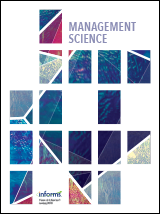Academic articles
Practitioner articles
Working papers
Books
Book chapters
Case studies
Other publications
Subject(s)
Technology, R&D management
Keyword(s)
paradox, dysfunctional dynamics, vicious cycle, goals, longitudinal qualitative, process model
Subject(s)
Diversity and inclusion; Human resources management/organizational behavior
Keyword(s)
gender, backlash, negotiation, bargaining, gender gap
ISSN (Online)
1939-2222
ISSN (Print)
0096-3445
Subject(s)
Health and environment; Management sciences, decision sciences and quantitative methods
Keyword(s)
vaccination campaign, fractional-dose vaccines, epidemiology, optimal Control
JEL Code(s)
L18; C51; C54; C61; C63
ISSN (Online)
1526–5498
ISSN (Print)
1523-4614
Subject(s)
Economics, politics and business environment
Keyword(s)
price dispersion, stability, price competition, consideration sets
JEL Code(s)
D43 L11
We study the pricing of homogeneous products sold to customers who consider different sets of suppliers. We identify prices that are stable in the sense that no firm wishes to undercut a rival or to raise its price when rivals are able to respond by offering special deals. We derive predictionsforstable and disperse prices acrossseveral price-consideration specifications, and we contrast the implications with those of conventional approaches.
[This paper supersedes working papers Stable Price Dispersion (2024) and A Theory of Stable Price Dispersion (2019).]
© 1999-2026 John Wiley & Sons, Inc
© 1999-2026 John Wiley & Sons, Inc
Subject(s)
Marketing; Strategy and general management
Keyword(s)
centralization, decentralization, deglobalization, organizational structure
JEL Code(s)
F23, L22, M16, M31
ISSN (Online)
1758-6763
ISSN (Print)
0265-1335
Subject(s)
Economics, politics and business environment; Ethics and social responsibility
Keyword(s)
exploitation, vignettes, fairness, power, distribution
ISSN (Online)
1540-5907
ISSN (Print)
0092-5853
Subject(s)
Human resources management/organizational behavior; Strategy and general management
Keyword(s)
Social networks, network ties, organizational research
ISSN (Online)
2631-7877
ISSN (Print)
2631-7877
Subject(s)
Economics, politics and business environment
Keyword(s)
model of sales, captives, shoppers, price dispersion, clearinghouse models
JEL Code(s)
D43, L11, M3
We generalize the captive-and-shopper model of sales to allow asymmetries in production costs and captive audiences in an oligopoly. Both kinds of asymmetry determine the firms that compete (via randomized sales) to serve the price-comparing shoppers, while other firms exploit their captive audiences. In contrast to a model with symmetric costs (but asymmetric captive audiences) there are natural situations in which more than two firms use sales by engaging in pairwise battles across different price intervals. We then study the choice of production technologies via costly process innovations. A distinctive asymmetry emerges endogenously: one firm innovates more and becomes the dominant supplier of shoppers. The pattern of innovations connects to the size of firms’ captive bases and the shape of technological opportunity. We also provide a trio of extensions to consider costly acquisitions of captives and shoppers, and captives’ choice of captor.
Copyright ©2025 by the American Economic Association.
Volume
45
Subject(s)
Economics, politics and business environment
Keyword(s)
Formalization, Tax Avoidance, VAT, Personal Income Tax
JEL Code(s)
O17, H26, H24, H25
ISSN (Online)
ISSN 1945-774X
ISSN (Print)
ISSN 1945-7731
Subject(s)
Economics, politics and business environment; Information technology and systems
Keyword(s)
data-driven quality improvements, externalities, co-opetition, data sharing
Large, generalist, technology firms—so-called “big-tech” firms—powerful in their primary market, routinely enter secondary markets consisting of specialist firms. Naturally, one might expect a specialist firm to be fiercely protective of its data as a way to maintain its market position in the secondary market. Counter to this intuition, we demonstrate that a specialist firm willingly shares its market data with an intruding generalist. We do so by developing a model of cross-market competition in which the data collected via consumer usage in one market can improve product quality in another. We show that a specialist firm shares its data to strategically create codependence between the two firms, thereby softening competition and transforming the generalist firm from a traditional competitor into a coopetitor. For the generalist intruder, data from the specialist firm substitute for its own investments in product quality in the secondary market. As such, the act of sharing data makes the generalist a stakeholder in the data collected by the specialist, and consequently in the specialist’s continued success. Moreover, although the firms benefit from data sharing, consumers can be worse off from weakened price competition and lower investments in innovation. Our results have managerial and policy implications, notably on account of backlash against data collection and the market power of big-tech firms.
© 2025, INFORMS
ISSN (Online)
1526-5501
ISSN (Print)
0025–1909

